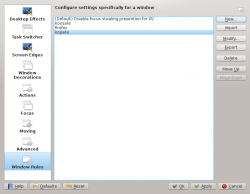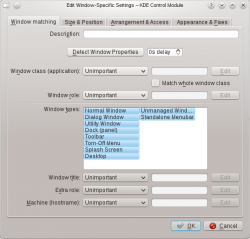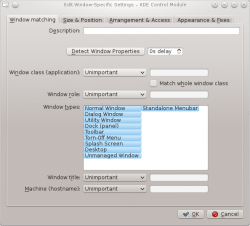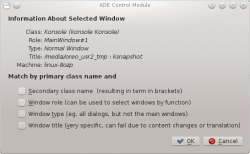KWin Rules: Difference between revisions
No edit summary |
|||
| Line 31: | Line 31: | ||
As the name implies, <menuchoice>Window matching</menuchoice> is used to specify criteria to match one or more windows. The other three tabs are used to alter the characteristics of the matching windows. | As the name implies, <menuchoice>Window matching</menuchoice> is used to specify criteria to match one or more windows. The other three tabs are used to alter the characteristics of the matching windows. | ||
=== | ===Rules=== | ||
====Evaluation==== | |||
KWin evaluates the rules when an application starts and after editing rules. Any matching rule's attribute(s) override the application's corresponding attribute(s). | KWin evaluates the rules when an application starts and after editing rules. Any matching rule's attribute(s) override the application's corresponding attribute(s). | ||
====Precedence | ====Precedence==== | ||
In the <menuchoice>Window Rules</menuchoice> window, the rules are listed in the order in which they are processed. | In the <menuchoice>Window Rules</menuchoice> window, the rules are listed in the order in which they are processed. | ||
The rule at the top of the list is processed first, followed by the next rule until the end of the list is reached. | The rule at the top of the list is processed first, followed by the next rule until the end of the list is reached. | ||
==== | ====Conflicts==== | ||
In the event two rules match a window and affect the same attribute, the first rule in the list takes precedence. | In the event two rules match a window and affect the same attribute, the first rule in the list takes precedence. | ||
| Line 71: | Line 73: | ||
The <menuchoice>Detect Window Properties</menuchoice> function simplifies the process of entering the matching-criteria. | The <menuchoice>Detect Window Properties</menuchoice> function simplifies the process of entering the matching-criteria. | ||
# | # For the application you'd like to create a rule, start the application. | ||
# Next, set the number of seconds of delay before the <menuchoice>Detect Window Properties</menuchoice> function starts. The default is zero seconds. | # Next, set the number of seconds of delay before the <menuchoice>Detect Window Properties</menuchoice> function starts. The default is zero seconds. | ||
# Click on <menuchoice>Detect Window Properties</menuchoice> and | # Click on <menuchoice>Detect Window Properties</menuchoice> and | ||
# When the mouse-cursor turns to cross-hairs, place it inside the application window and left-click. | # When the mouse-cursor turns to cross-hairs, place it inside the application window and left-click. | ||
# A new window is presented with information about the selected window: | # A new window is presented with information about the selected window: | ||
#* Class | #* '''Class''' | ||
#* Role | #* '''Role''' | ||
#* Type | #* Type''' | ||
#* Title | #* Title''' | ||
#* Machine (hostname) | #* '''Machine (hostname)''' | ||
Revision as of 19:19, 21 February 2012
Overview
KWin allows the end-user to define rules to alter the behavior of an application's windows.
For example, when an application is started, it can be forced to always run on Virtual Desktop #2. Or a defect in an application can be worked-around by using a rule to, say, always force the window on top of all others.
This page will define the different settings and the attributes. For the impatient folks, working examples will be listed. Whenever possible, screen shots will be used to show example settings.
KWin Rule Editor

Invoking the Editor
There are several ways one can invoke the Rules editor. Below are a couple:
- Right-click on the title-bar of any window, choose and in the Configure window, select or
Anatomy

The editor is composed of four tabs:
As the name implies, is used to specify criteria to match one or more windows. The other three tabs are used to alter the characteristics of the matching windows.
Rules
Evaluation
KWin evaluates the rules when an application starts and after editing rules. Any matching rule's attribute(s) override the application's corresponding attribute(s).
Precedence
In the window, the rules are listed in the order in which they are processed.
The rule at the top of the list is processed first, followed by the next rule until the end of the list is reached.
Conflicts
In the event two rules match a window and affect the same attribute, the first rule in the list takes precedence.
Window Matching

The tab provides a series of matching-criteria fields used to identify application windows:
- - This window and all its children windows.
- and
- - a window within the application (e.g. Main Window)
- - Normal Window, Dialog Window, etc. The different types are presented.
- - self-explanatory.
- - Useful when identifying a window which is logging on to a specific remote machine.
While it's possible to manually enter the above information, the preferred method is to use the button.
For each field, the following operators can be applied against the field value:
- Unimportant - fill out
- Exact Match
- Substring Match
- Regular Expression
Detect Window Properties

The function simplifies the process of entering the matching-criteria.
- For the application you'd like to create a rule, start the application.
- Next, set the number of seconds of delay before the function starts. The default is zero seconds.
- Click on and
- When the mouse-cursor turns to cross-hairs, place it inside the application window and left-click.
- A new window is presented with information about the selected window:
- Class
- Role
- Type
- Title
- Machine (hostname)
The information is used to back-fill the criteria.
By using a combination of the information, you can tailor whether the rule will be generic and apply to the entire class or certain windows, say a particular Type of window, within the class.
Window Attributes
Examples
Force a Window on a Desktop
Force a Window on all Desktops
Suppress a Window showing on Pager
Force a Window to the Top
Good for knotes
Multiple Rules per Application
e.g. Thunderbird on one desktop and composition window on any

